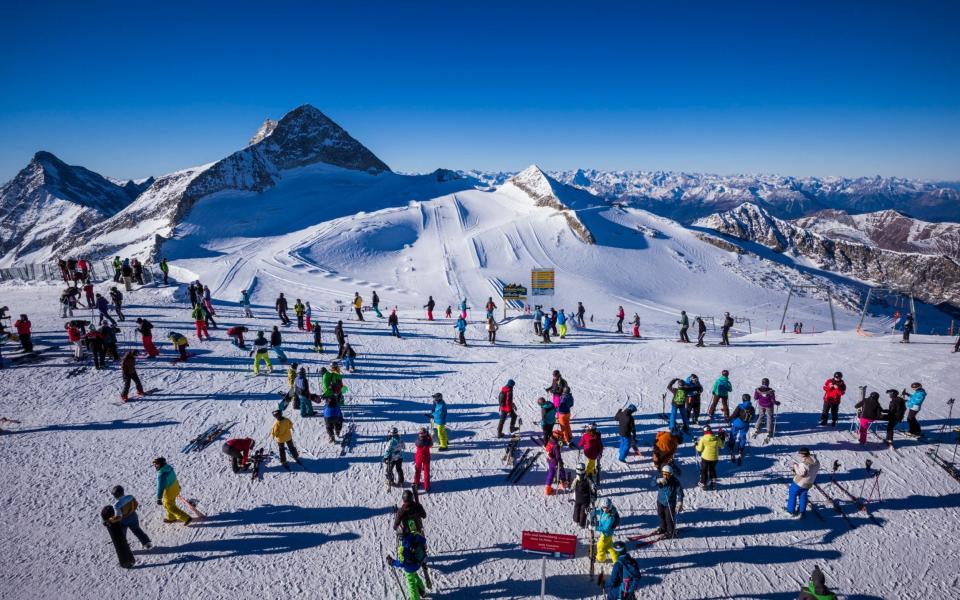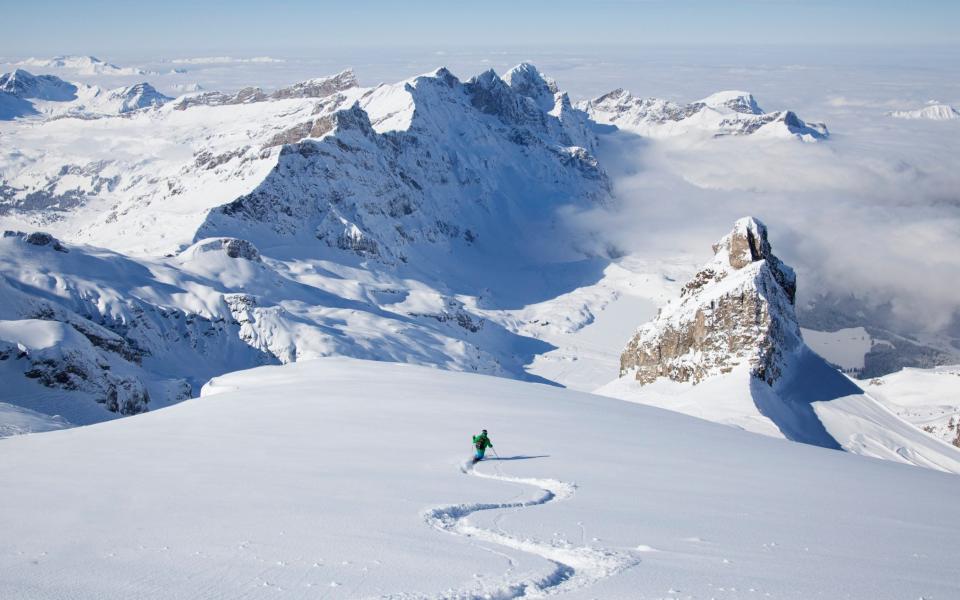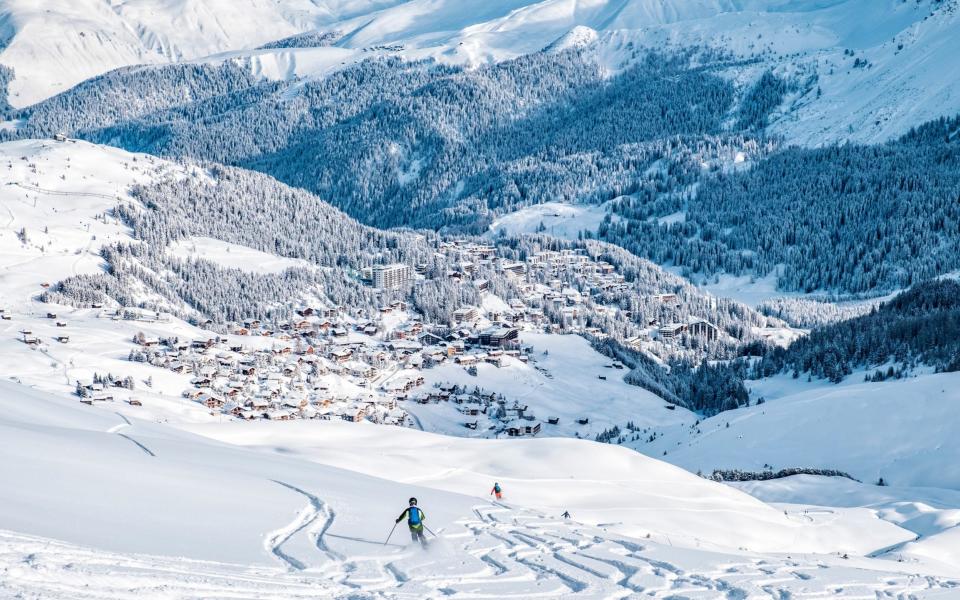The rules and regulations that could catch skiers out this winter

The upcoming ski season is set to be like no other. For holidaymakers it will mark a long-awaited return to the slopes, for operators it will be back to business, and for resorts it'll herald a new era of post-pandemic holidays.
But despite their eagerness British skiers and snowboarders will be, quite rightly, out of practice when it comes to the logistics of going on holiday to the mountains. Things have changed significantly since February 2020 when the last British departures were able to hit the slopes – thanks in part to both the pandemic and Brexit.
From Covid passes and new rules on who might serve you in a chalet, to requirements for passports and changes to medical cover, we've picked apart the rules and regulations likely to catch skiers and snowboarders out this winter, to give you a fighting chance of enjoying a hassle-free ski holiday – you’ve earned it after all.
The introduction of Covid passes
As nations have reopened and travel restrictions have eased, the use of Covid passports, which provide proof of inoculation, a negative test or recovery from coronavirus, have become commonplace across the continent and they’re set to stick around over winter.
Skiers should expect to have to carry such a pass with them on their ski holiday – for access to bars and restaurants in particular – and, in Austria and Italy, to buy lift passes and hit the slopes.
The NHS Covid Pass, available on the NHS app, can be used for this and is now accepted by all EU countries, as well as most nations further afield, such as Canada.

Rules also vary for children of different ages. Currently in Austria, unvaccinated over-12s must have proof of recovery or a negative test (no older than 24 hours for antigen, no more than 72 hours for PCR) to access enclosed lifts, accommodation, restaurants and bars. By comparison, in some resorts in North America, anybody of any age must be vaccinated to eat indoors on the mountain.
If going on holiday for a week, parents will need to make sure they’re up to speed with where to get tests locally in order for youngsters to be able to move freely around resort and consider their choice of destination carefully – one ski expert suggests picking a smaller resort with more chairlifts and fewer gondolas (which would require Covid passes in Austria and Italy).
Over 65s could also face trouble in France – Covid boosters are set to be mandatory for this age group in order to use the pass sanitaire to access public spaces like restaurants and bars. The pass will only be compulsory on ski lifts if the national infection rate surpasses 200 per 100,000.
Skiers are advised to check thoroughly before they travel as to what proof and type of test is required in each destination or how to show their vaccination status with their tour operator. Inghams, part of Hotelplan, has launched an interactive online Covid-19 hub, complete with the latest requirements, to help its customers navigate the uncertainty. A full guide to all the vaccination requirements for skiers this winter can also be found here.
The threat of tightening border restrictions
It’s hard to forget the series of events that occurred last winter after the Alpha variant was discovered in the UK in December. Skiers' hopes of heading out to the slopes were left in last-minute tatters as countries across the globe began to close their borders and suspend flights with Britain.
A lot has changed since then, notably the worldwide vaccine rollout. However recent news that Morocco has closed its borders to the UK due to concerns over rising cases leaves a bitter taste as the ski season approaches.
As Michael Pettifer from insurance provider MPI Brokers explains: “Border closures are a concern. Many insurances don’t provide cover for this, so it is a good idea to see what travel companies can help with – many are offering some form of refund if this happens.”
Holidaymakers should check their terms and conditions carefully and try to book through a fully-bonded tour operator if possible. If the pandemic continues to impact foreign travel as winter approaches, you’ll get a full refund (or an offer of an alternative trip if you’d prefer) if the bonded operator is forced to cancel because it cannot run the holiday due to Covid travel restrictions, Foreign Office advice or resort closures.
Reassuringly though, Rupert Longsdon, founder of the Oxford Ski Company, told Telegraph Travel that the news from Morocco is no “cause of concern” for skiers. “The rhetoric across the board has been one of positivity. The news from resorts on their internal operations to manage the situation has been nothing short of heroic,” he said.
Changes to travel insurance and health cover
Since leaving the EU in January there have been changes to the European Health Insurance Card (EHIC) scheme – which has long meant Britons can receive free (or reduced cost) health care on the continent. This will be the first winter that skiers and snowboarders travel under the new regime.
The old EHIC card has been replaced by a new Global Health Insurance Card (GHIC), which continues to offer “free or reduced-cost, state-provided healthcare where treatment becomes medically necessary during a temporary visit to the European Union (EU),” including cover for those with long-term conditions. Notably, European Health Insurance Cards issued before the end of 2020 will remain valid until they expire. What's more, those without either an EHIC or GHIC continue to be covered too – they should contact the NHS BSA for a Provisional Replacement Certificate if they require necessary healthcare whilst in the EU.
The pandemic also continues to impact travel insurance validity. Pettifer from MPI explains: “Policies are changing all the time due to the ups and downs of travel restrictions, so always double check the cover prior to purchase – if the FCDO advise against travel to your destination you may find the policy you have purchased becomes invalid if you travel against that advice.”
He also warns that skiers should prepare to pay more for adequate cover: “Premiums will go up due to the usual factors such as inflation, increasing cost of claims and this year, the scarcity of available insurance underwriters.”

There are also extra things to think about when taking out a policy this winter, such as Covid-19 cover. Some policies will cover you if you contract the virus abroad, others will cover you if you have to cancel due to testing positive before departure. But this is not a given in standard policies, so it’s worth checking the small print – or even better, calling your provider to have your questions answered. And as always, ensure you have adequate cover for winter sports, including any extra activities you might intend to take part in off the slopes.
A reduction in the number of chalets available
Catered chalet holidays have long been a favourite with Britons but this season, thanks to both Brexit and the pandemic, the number on offer has significantly shrunk. Crystal Ski has pulled out of chalets entirely and Inghams has cut its programme – including sister company Ski Total – from over 120 to just 17.
“The chalet ski market faces, and will continue to face challenges post Brexit and Covid-19. With these challenges in mind, and the marginal rise in demand for ski hotels amongst our customers, creating a reduced, more focused chalet programme for this coming winter made sense,” explains Joe Ponte, CEO of Hotelplan, which owns Inghams.
Skiers should expect there to be fewer last-minute chalet deals available, less availability in the most popular resorts (in part due to locals deciding to holiday on home soil this winter) and in some cases, increased prices.
“We continue to invest in the same high standards of service across our chalet programme and we don’t expect there to be many surprises when it comes to the chalet experience itself… [But] with reduced chalet availability, it is likely that customers looking for a chalet holiday during peak dates may miss out on their first choice,” said Ponte.
Fewer British staff working in resorts
A survey by Seasonal Businesses in Travel suggests that the number of UK staff working in French ski resorts has dropped from a pre-Brexit figure of approximately 8,000 staff to just 2,000 this coming winter. This represents a 75 per cent reduction in UK employment opportunities for mainly 18-35 year olds hoping to work in the ski industry – devastating news for anyone dreaming of working a ski season in the Alps.
The dramatic changes are due to new rules in the EU. UK citizens now have to apply to work in the bloc and obtain a visa if their stay is more than three months. The detailed paperwork associated with this two-step application process (both can be refused) makes it much harder for operators to employ British staff.
“As a consequence of this detailed process, some UK operators have simply ceased trading, others changed their business models, employed more EU citizens or have reduced the size of the holiday programmes,” explains Charles Owen, managing director.
Therefore, British holidaymakers should be prepared for some changes to the people who serve, pick them up from the airport (fewer transfers are reportedly available for some resorts) and entertain them on holiday in Europe. “Some of our chalets are still staffed by British team members, alongside highly qualified staff from Europe – but we’re confident our people will continue to quite literally ‘make the holidays’ of our chalet guests,” said Ponte from Inghams.
A muted, less-wild approach to après ski
When it comes to partying off the slopes, in the spotlight is the Austrian resort of Ischgl – which was pinpointed as a reported epicentre of the virus in early 2020. It has toned down its early-season opening celebrations to herald a new, safer, more regulated approach to parties in the mountains this season. Instead of its usual rock-and-roll approach to its Top of the Mountain opening concert in late November, this year the headline act will be Operatic-Pop trio Il Volo.
“Regarding après-ski we welcome the fact that the legislature has provided clarity and clear regulations to guarantee the best health and safety protection,” says Alexander von der Thannen, chairman of the Paznaun-Ischgl Tourism Association, who describes the plans for the concert as an “elegant winter opening” focusing on a “high-quality” experience.
Covid passes (see above) will play a large role in this regulation across all ski nations. “Strict measures are applied for après-ski which conform to the general rules for night gastronomy in Austria. Amongst others, access is for example only granted with a valid negative PCR test result, proof of vaccination, or evidence of recovery,” explains Thannen.
An increase in paperwork and testing
Lessons, equipment hire, special insurance, lift passes… it’s safe to say ski holidays come with an extra amount of holiday admin when compared to a summer jaunt to the beach. Now skiers and snowboarders need to be prepared for another level of paperwork to complete before departure – for many it could be their first holiday abroad since the pandemic hit.
While the travel rules have been eased for double-jabbed Britons (read them here), testing requirements and forms remain. For example, all passengers returning to the UK must complete a passenger locator form, complete with booking reference for any tests that might be required. Inoculated travellers must take a privately booked lateral flow test on Day 2, while unvaccinated travellers face three tests (one before they return to the UK, one on Day 2 and one on Day 8) plus quarantine at home.

This is all in addition to any forms you might be required to fill out prior to arrival in your destination, or tests you might need to take. For example, to visit France arrivals must present a completed ‘sworn statement’ (déclaration sur l’honneur) form self-certifying they are not suffering from symptoms and have not been in contact with confirmed cases in the preceding fortnight. It pays to be up to speed with all the latest in advance of your trip, to avoid last-minute panic, confusion and tests not arriving in time.
Changes to passport validity
Before Brexit, anyone visiting an EU country only needed a passport that was valid for the proposed duration of their stay. Since January 1 2021, however, they need to have at least six months of validity on their travel documents. What’s more, some people whose passports do not expire until the end of 2021 (the start of ski season) or even the beginning of 2022 may also be turned away when entering the EU. Some UK passports have up to 10 years and nine months of validity, but the EU will now ignore the additional nine months. This means some people will be refused entry to the EU, even if they have 15 months left on their passports.
The Passport Office turnaround time is already approximately three weeks for online applications, according to the Home Office.
A risk of kit selling out
As Christmas approaches skiers and snowboarders are ready to dust off their equipment, but many will be looking to freshen up their look ahead of their return to the slopes – but it might not be as easy as next-day delivery and fully stocked retail stores.
“With Brexit and Covid, importing products into the UK has become a slower and more time-consuming process. Ski hardware and clothing, especially those made in Asia or North America will be the ones hit the hardest with shipping and therefore may have a limited or delayed stock in the UK retail,” explains Tord Nilson, Brand Director for snowsports equipment specialists Iconic Agency.
“The best bet is to support your local ski and snowboard retailer and grab yourself the kit that you really want before it’s gone – also there will be plenty of great deals on last years stock as the retail industry struggled to stay open with the restrictions in place.”

